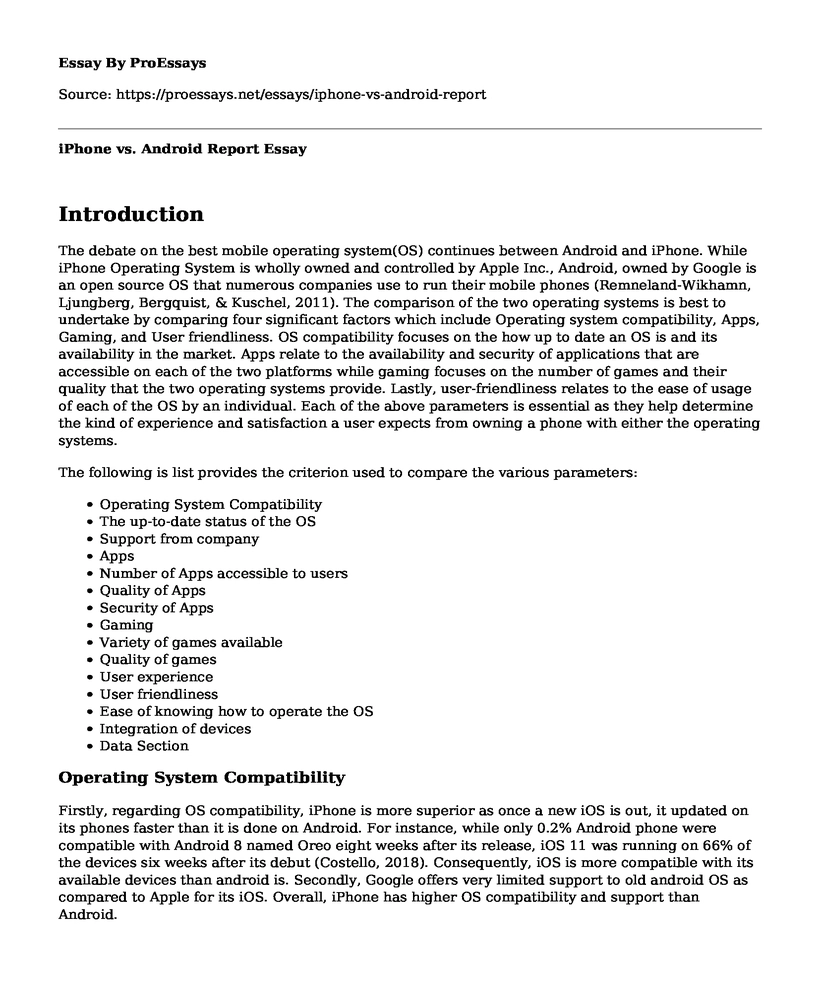Introduction
The debate on the best mobile operating system(OS) continues between Android and iPhone. While iPhone Operating System is wholly owned and controlled by Apple Inc., Android, owned by Google is an open source OS that numerous companies use to run their mobile phones (Remneland-Wikhamn, Ljungberg, Bergquist, & Kuschel, 2011). The comparison of the two operating systems is best to undertake by comparing four significant factors which include Operating system compatibility, Apps, Gaming, and User friendliness. OS compatibility focuses on the how up to date an OS is and its availability in the market. Apps relate to the availability and security of applications that are accessible on each of the two platforms while gaming focuses on the number of games and their quality that the two operating systems provide. Lastly, user-friendliness relates to the ease of usage of each of the OS by an individual. Each of the above parameters is essential as they help determine the kind of experience and satisfaction a user expects from owning a phone with either the operating systems.
The following is list provides the criterion used to compare the various parameters:
- Operating System Compatibility
- The up-to-date status of the OS
- Support from company
- Apps
- Number of Apps accessible to users
- Quality of Apps
- Security of Apps
- Gaming
- Variety of games available
- Quality of games
- User experience
- User friendliness
- Ease of knowing how to operate the OS
- Integration of devices
- Data Section
Operating System Compatibility
Firstly, regarding OS compatibility, iPhone is more superior as once a new iOS is out, it updated on its phones faster than it is done on Android. For instance, while only 0.2% Android phone were compatible with Android 8 named Oreo eight weeks after its release, iOS 11 was running on 66% of the devices six weeks after its debut (Costello, 2018). Consequently, iOS is more compatible with its available devices than android is. Secondly, Google offers very limited support to old android OS as compared to Apple for its iOS. Overall, iPhone has higher OS compatibility and support than Android.
Verdict: iPhone
Apps
The apps or applications that a phone has are what define a phone's usability. Firstly, as an open source OS, Android has less strict rules on the kind apps that users can post on Play Store. The less stringent rules mean that people can publish insecure apps that can cause damage to their phones. Further, poor quality apps can also find their way to the play store easily. On the contrary, iPhone has rigorous control on the kind of apps that are posted on App Store (Smith, 2018). Consequently, while there are fewer apps on iPhone platform, they are more secure and of higher quality. From the comparison of the two, iPhone is a superior phone regarding quality and security of Apps while Android takes the lead on the number of applications that users can access.
Verdict: Tie
Gaming
As smartphones become more powerful, gaming is likely to shift to mobile phones. Indeed, according to Costello (2018) iPhone is expected to become a significant gaming platform overtaking Sony and Nintendo shortly. Comparing the two, while Android has numerous games, iPhone has better quality games.
Verdict: iPhone
User Friendliness
User friendliness relates to the ease of use in accessing apps and performing various tasks. In this aspect, iPhone remains a formidable force as it sustains its user interface structure across different phone models (Shepherd & Walker, 2018). However, Android, with its open source approach has a varied user experience across different companies (Costello, 2018). On the other hand, since Apple makes smartphones and computers, it is easier to integrate one work across the devices as compared to Android as there are few companies that can have such degree of integration (Costello, 2018).Consequently, some Android phones have a better user experience than others making it difficult to come to one-fits-all criteria for determining its user-friendliness.
Verdict: iPhone
Conclusion
From the analysis of the two mobile phone operating systems, iPhone and Android remain formidable foes in the smartphone segment. However, iPhone scores highly on the properties that have been considered in the comparison. It is only on apps where it is challenging to determine which is more powerful. Overall, iPhone remains the leading OS for smartphones.
References
Remneland-Wikhamn, B., Ljungberg, J. A. N., Bergquist, M., & Kuschel, J. (2011). Open innovation, generativity and the supplier as peer: the case of iPhone and Android. International Journal of Innovation Management, 15(01), 205-230.
Smith, J. (2018, February 7). Android vs. iPhone: 14 reasons Android is still better. GottaMobile. https://www.gottabemobile.com/android-vs-iphone-android-better/.
Shepherd, A. & Walker, D. (2018, March 13). Android vs. iOS: Which mobile OS is right for you. ITPro. http://www.itpro.co.uk/mobile/30409/android-vs-ios-which-mobile-os-is-right-for-you.
Costello, S. (2018, April 9). Is iPhone or Android the better smartphone?Life Wire. Retrieved from https://www.lifewire.com/iphone-vs-android-best-smartphone-2000309
Cite this page
iPhone vs. Android Report. (2022, May 15). Retrieved from https://proessays.net/essays/iphone-vs-android-report
If you are the original author of this essay and no longer wish to have it published on the ProEssays website, please click below to request its removal:
- Ted Talk: Navigating Our Global Future by Ian Goldin Essay
- Use of Virtualization in the Organization Essay
- Essay Sample on Investment in the Internet of Things
- Paper Example on Innovation: A Catalyst for Business Growth
- Essay Sample on Deep Learning: A Crucial Component of Artificial Intelligence
- HCA Health Care: Overcoming Data Challenges With Tech Trends - Essay Sample
- Essay Sample on In a World of Growing Population: Effective Communication is Key







